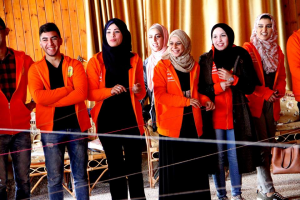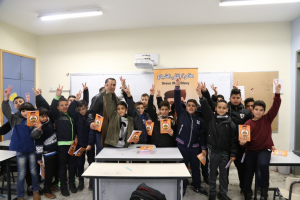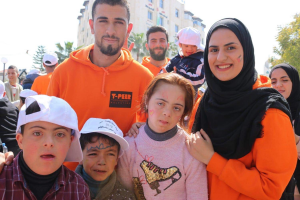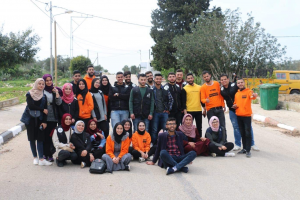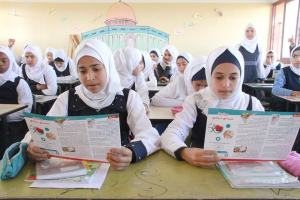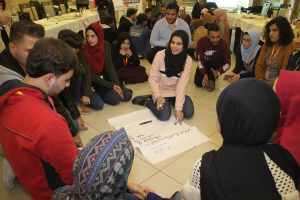Young people are at the heart of development and positive change. They are the leaders of tomorrow but – most importantly – members of society who deserve attention right now. It is only by being supported, invested in, and empowered with knowledge, tools, and services that youth will be able to know about and defend their rights, realize their full potential, and transform their society for the better.
When young people are empowered concerning their sexual and reproductive health and rights, the entire society benefits: family poverty levels decrease and so do gender-based violence and domestic violence.
The fight to end gender-based violence, poverty, and discrimination and achieve justice and equality for all cannot overlook sexual and reproductive health rights. This applies also to the Sustainable Development Goals, the global agenda that leaves no one behind.
Violence-free and equality-driven families and communities are the backbone of a just, fair society, where every individual is valued and contributes to development. Young people are the engine of positive change.
European Union member states such as Belgium, Italy, and Spain are actively investing in Palestinian young people to support their full development and empowerment, promote their rights, and achieve gender equality. Their support is provided through various actions that address multiple aspects of development, fostering cooperation and collaboration with active local and international organizations, institutions, and agencies, and with a view to ensuring that all interventions are sustainable and effective in responding to the needs and rights of Palestinian youth.
With the support of Belgium, UNFPA Palestine is also implementing a two-year project on gender and education that aims to create a violence-free environment in 15 schools in East Jerusalem. The project focuses on promoting behavioral change by addressing the traditional patriarchal norms and values from a development perspective in order to promote gender equality and contribute to reducing gender-based violence among male and female students between 10 and 18 years old in East Jerusalem.
More specifically, through this project, UNFPA will be working closely with Enabel, the Belgian development agency, UNRWA, civil society, and Y-Peer, the Youth Peer Education Network, to increase the opportunities for positive and active engagement of young men and women in promoting gender equality and creating a peaceful environment through technology-related methods and peer education. The grant will also strengthen the national capacity by engaging with the teachers, counselors, and parents at the targeted schools for better protection of young women and men from digital violence, including sexual harassment, and will carry out awareness-raising campaigns to prevent and combat child marriage in Jerusalem. Among the various activities and campaigns foreseen are the “brave girl and boy diary,” statistical school competitions, and an exchange of good practices between Belgium and Palestine.
The project builds on UNFPA and Enabel expertise towards building resilience of young people in the most affected communities in East Jerusalem. The project complements efforts undertaken by UNFPA and Enabel that aim to create an enabling educational environment through Enabel’s work on school rehabilitation, STEAM, and life skills in East Jerusalem, and UNFPA’s interventions with the national curriculum and the pilot “Brave Man” campaign, currently being implemented in ten boys’ schools in the West Bank.
In line with its longstanding support for the Palestinian people in the field of healthcare and gender equality, Italy has been supporting UNFPA since 2017 in its work to empower young Palestinians on sexual and reproductive health services and rights (SRHR).
The project – the first of its kind in Palestine – works with Al-Azhar and Al-Quds universities, schools, civil society, and students to ensure that young people, especially young women and girls, fully enjoy their sexual and reproductive health rights, addressing taboos, social stigmas, and other barriers. It focuses on enhancing capacities to develop and implement policies and mechanisms that prioritize access to information and services for SRHR for young people, especially those furthest behind; developing, promoting, and institutionalizing tailored health services for young people; and improving leadership and participation of adolescents and youth on SRHR interventions. A total of 34,000 young people have benefited directly from the project, with an additional 20,000 followers on Facebook, which increases their access to information about SRHR.
A unique component of the project, which has proven to be very successful in promoting sustainability and long-term impact, is the active participation of young people in the design, implementation, and evaluation of the project’s components and deliverables. With their direct engagement, young people take up their role as agents of change and bring their voices, initiative, and potential to the table. Youth play a key role in the design, establishment, and management of Youth Friendly Health Services (YFHS) centers at universities; they are members of the national and subnational steering committees of the project to coordinate and jointly lobby for SRHR; they lead in community mobilization, working hand in hand with women leaders, healthcare providers, religious leaders, and NGOs; and conduct peer-to-peer SRHR education inside universities, schools, and marginalized communities.
This year, the project will scale up interventions with and for Palestinian youth, especially those left behind in fragile locations, through establishing a national Adolescents Health Coalition to advocate for policy change and to join efforts to ensure a healthy transition into adulthood for Palestinian adolescents; scaling up interventions at YFHS centers in universities through nontraditional innovative service-provision tools and methodologies; opening a new center in Hebron University to reach vulnerable youth; empowering and equipping young people with knowledge and tools to advocate for their rights through leading innovative initiatives in partnership with universities, community leaders, and civil society organizations.
“My participation in this project has empowered me to realize my right to freely and responsibly make my own decisions regarding my future and to advocate for these rights in my community and within my family.”
Ola, a 22-year-old young woman from Gaza, beneficiary of the Italy/UNFPA program
In 2017 and 2018, UNFPA Palestine implemented youth-led campaigns and activities within a project funded by Spain: “Communicate against Gender-Based Violence.” The overall objective of this proposal was to prevent gender-based violence in Palestine through behavioral change communication. The activities included the Brave Man Campaign, developed by Sharek Youth Forum and piloted in both the Gaza Strip and the West Bank, which aimed to include noncognitive methods of learning regarding gender issues for school students, counselors, and youth activists; Y-Peer Caravan, prepared by students in the West Bank and Gaza, with messages about gender-based violence and gender quality. Y-Peer members travelled for more than a month around the Gaza Strip and West Bank, reaching marginalized communities and refugee camps to raise awareness and create dialogue about these topics. A youth summit was held in East Jerusalem with 340 participants, organized by Burj al-Luq Luq in partnership with the Directorate of Education and the Jerusalem Legal Court. It focused on combatting child marriage and the importance of educating girls and young women. Early marriage plays by the Y-Peers, which targeted parents and adolescents to raise awareness about the negative consequences of early marriage, reached 982 community members in the West Bank and Gaza, and was presented in two safe spaces for women and girls and in marginalized communities, in cooperation with local community-based organizations.
In partnership with Ma’an TV, eight reality TV show episodes and nine talk shows were produced that featured nine influential Palestinian fathers as they spent one day alone with their children, in order to raise public awareness of gender equality and the value of domestic work. After each reality TV episode, a talk show featuring the public figure was produced and broadcast. On these talk shows, the public figures spoke about their experience, and experts were invited to further discuss gender-equality issues. The episodes, which were broadcast in 2017 and 2018, were viewed 211,700 times on Ma’an TV’s Facebook page.
“It was a unique experience in our community. It has made me more cooperation-oriented inside my house and inspired me to use my work to change the inherited concepts and stereotypical views that I had of women.”
Khaled al-Masou from Bethlehem, a Palestinian actor and one of the heroes of the famous series Watan on Watar, one of the participants in the reality TV show
When countries work together to support each other, change happens. EU member states have been proudly stepping up their efforts to collaborate, optimize, and strengthen their support to realize the sexual reproductive health and rights of Palestinian youth, because no one should be left behind on the path to development, and everyone can be part of the solution.
“This project is like a movement led by young people: it has equipped me and motivated me to speak out and become a change-maker in my community.”
Isaac Hillis, 21 years old
“Despite all the difficulties and challenges that we face in advocating for our SRHR in our community, we will keep working to break down all barriers that prevent us from reaching our full potential.”
Dalia from Gaza, 20 years old
Article photos courtesy of the Italian Agency for Development Cooperation.


